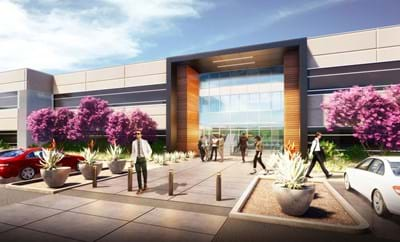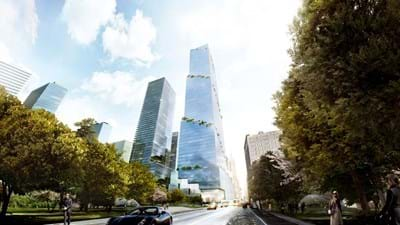- Home EN
- News
- Latest news
- 2021
- Bouwinvest is looking to step up its presence in North America
Bouwinvest is looking to step up its presence in North America
Investing successfully in commercial real estate takes a deep understanding of local market dynamics, but many of the biggest investment players in American markets have their headquarters across the ocean. Global funds pour tens of billions of dollars into the U.S. markets every year, investing in core assets in the nation’s biggest cities and fueling the growth of new CRE sectors.
Now, even more overseas real estate investors are looking to step up their presence in the U.S. Bouwinvest, a Dutch pension fund investment manager with nearly $16B in assets under management globally, currently holds a $1.65B portfolio in North American CRE assets, and is looking to expand its presence to around $2B over the next two years.
Bisnow spoke with Bouwinvest North America Senior Portfolio Manager Bert van den Hoek — the inaugural member of Bouwinvest’s Manhattan office — to understand more about how foreign investors are viewing the U.S. market and where Bouwinvest and its American partners are searching for strong, risk-adjusted yields.
Bisnow: What does Bouwinvest’s North American portfolio look like? Has it changed in the last year?
Van den Hoek: We’ve designed our portfolio around residential and logistics, which each comprise around 35% of our North American holdings. Another 10% of our portfolio is divided between office and grocery-anchored retail.
The remaining 20%, which is the portion that is now growing the most quickly, is invested across alternative assets, including life sciences, healthcare and data centers. We see a lot of opportunities for growth post-COVID in these sectors.

One of the biggest moves we made in the last year was in life sciences. We committed $60M to Blackstone's recapitalization of BioMed Realty, which holds life sciences assets in some of the largest biotech clusters in the country.
Bisnow: How much capital are you planning to deploy in the coming years, and how will you decide where it goes?
Van den Hoek: Over the next two years, we plan to invest an additional $350M into North America. The belief in urbanization is one of the key pillars of our investment strategy, so we’re looking at logistics, especially in urban infill properties, as well as our existing urban multifamily assets in core markets like New York and Los Angeles.
Much of our residential portfolio is multifamily at the moment, but we’re seeing a strong trend toward single family rental, especially in the Southeast and Sun Belt. Our portfolio in Canada is currently just in publicly traded instruments, and we are looking to add non-listed exposure particularly in multifamily, as well as logistics in that market.
Bisnow: How are you evaluating and mitigating risk for your investors?

Van den Hoek: We have the expertise in-house to take on development risk for build-to-core strategies. About a third of our North American fund is allocated for repositioning and development. We have recently completed a multifamily project in LA, and we are undertaking an office development project in coordination with Tishman Speyer, with whom we are partnering on the Spiral at Hudson Yards.
As a pension fund, though, our goal is to provide long-term, stable returns for our investors. Since Bouwinvest is European, we’re also bound by more stringent regulations than our U.S. counterparts when it comes to adding leverage to our portfolio. So we tend to target core, stable income assets.
We believe one of the biggest sources of risk to our long-term investments is climate change. We’ve been carefully mapping out our portfolio and increasingly sticking to the sustainability goals set forth by the United Nations. We think sustainable projects are where the best value creation will be in the long term, and it’s one way that we think differently from many U.S. investors.
Bisnow: Do you think being from the Netherlands, which is such a low-lying country, gives you a better understanding of climate risk and its effect on buildings?
Van den Hoek: Certainly some of the best civil engineers in the world come from the Netherlands, especially those that deal with rising tides. We know what the temperature rising can do to a country, and we’ve lived through storms that have claimed many lives.
Bouwinvest brings the same strong sustainability and innovation team that leads our Dutch holdings to the joint ventures and investments that we pursue around the world, which is a great asset to our partners in the U.S.
Bisnow: How do you balance making sustainably-minded investments with financial performance?
Van den Hoek: Our philosophy is that financial and societal returns will go hand in hand in the long term. That’s not to say that we’ll accept any investment that has a strong social impact, of course they have to clear financial benchmarks, but we aim to create societal benefits with all of our investments.
Coming from Europe, we’ve seen the development and evolution of cities over a very long span of time and we know what makes them more livable. Amsterdam, where we are headquartered, was very much a car-forward city for a long time, and the urban planners worked to create big boulevards that cut straight into the city. Now many of those lanes have been cut down, and the parking has been replaced by green space, bike lanes and places to play and work. There is a huge opportunity for cities around the world to reinvent themselves, and we want to help.
The original piece, written by Ben Paltiel, ran on Bisnow
Read the full article on Bisnow.com

